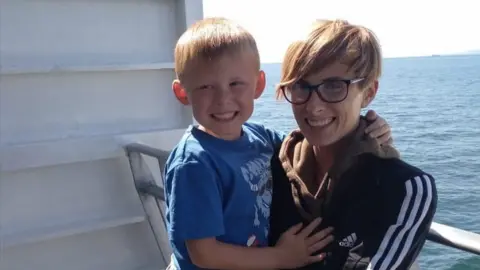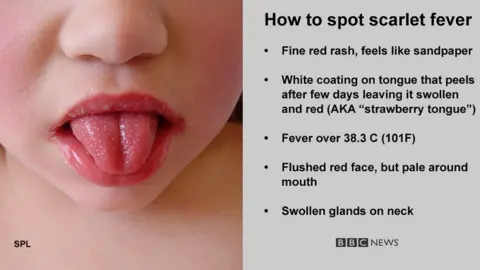Scarlet fever cluster found at County Down school
 Nikol Chambers
Nikol ChambersDozens of children at a County Down primary school are suffering from strep A bacterial infections, including cases of scarlet fever, a principal has said.
Michael Peacock, from Brackenagh West Primary School near Kilkeel, said that two children had been hospitalised.
Most strep A infections are mild and get better with antibiotics, but some people who catch it can get very sick.
The mother of a five-year-old boy at the school with scarlet fever urged parents to watch out for the symptoms.
Nikol Chambers' son AJ is now recovering, but she worried something was "badly wrong".
The Public Health Agency (PHA) says the number of cases of scarlet fever in Northern Ireland had been rising in the "past few months".
Figures show there were at least 104 cases in November, up from 43 in October.
'32 children off'
Mr Peacock said most of the cases at his school involved children in primaries one and two.
"We've had quite a lot of sickness over the last week or two which is not unusual for this time of year in schools," he told Radio Ulster's Evening Extra programme.
"But we discovered this morning just a raft of cases connected to the strep A bacterium and we have a total of 32 children off today."
Elsewhere, the Public Health Authority has recommended "all children in P1-P3" at Black Mountain Primary in Belfast take a preventative course of antibiotics.
It issued a letter to parents at the school after a pupil was diagnosed with "a severe form" of "Group A strep".
There had also been a case of chickenpox at the school. Developing both conditions at the same time can cause a more serious infection.
What is Strep A?
Strep A can cause a range of illnesses. Most cases are mild - a sore throat or a skin infection that can be easily treated with antibiotics.
Some people develop scarlet fever, which causes a skin rash (that feels like sandpaper) and flu-like symptoms, including a high temperature.
Very rarely, strep A can cause something called invasive group A streptococcal infection or iGAS, which can be deadly.
The PHA said it had received reports of 29 cases of iGAS so far this year. This figure, while higher than last year, is lower than in previous years, it said.

In the rest of the UK, eight children have died due to complications from strep A bacterial infections since September.
Of those, seven were in England and the other was a seven-year-old in Wales.
'Rash on his chest'
Mr Peacock said that while the vast majority of the sick pupils at Brackenagh West were being cared for at home, two had been hospitalised as a result.
Most of those affected in the school are young children with 21 cases in primary one and two classes and a further 11 spread across other classes.
"This would be quite typical as obviously younger children are more susceptible to germs. Their immune systems are less mature," Mr Peacock said.
Ms Chambers said she didn't suspect scarlet fever when her son became sick.
"He had the cold, he had a runny nose, he had a bad cough. He just wasn't feeling great and then he got a temperature," she said.
"Then he started with a rash on his chest and it coated him right down to his toes, like a blanket and about six hours.
"His was tongue turned white, he wouldn't drink anything, and the temperature just was through the roof."
Ms Chambers said she then took AJ to the out-of-hours GP in Newry on Saturday where he received antibiotics to treat the infection.
"I just knew there was something really badly wrong," she added.
Ms Chambers said AJ is now recovering from the infection with treatment.


Parents need to be vigilant - that is the message from health officials and local doctors.
While those looking after children may be nervous about this unfolding story, it is important to remember a majority of cases are mild.
The UK is experiencing an outbreak because for two years, and during the pandemic, children didn't mix and their systems are not immune to a number of different infections.
There is a warning that the number of cases of both strep A and scarlet fever will rise over the coming weeks.
It is highly contagious so the advice from experts is keep sick children at home.
Parents of children who deteriorate quickly should seek urgent medical advice.

Mr Peacock said that he is aware of other schools in the area that have reported higher than normal cases of the infection.
"We know that there are still a large number of our parents who are waiting to see their GPs about this, so at the moment we don't have a full picture," he added.
What should parents do?
As a parent, if you feel that your child seems seriously unwell, you should trust your own judgement. Contact your GP if:
- your child is getting worse
- your child is feeding or eating much less than normal
- your child has had a dry nappy for 12 hours or more or shows other signs of dehydration
- your baby is under three months old and has a temperature of 38°C, or is older than three months and has a temperature of 39°C or higher
- your baby feels hotter than usual when you touch their back or chest, or feels sweaty
- your child is very tired or irritable
Call 999 or go to A&E if:
- your child is having difficulty breathing - you may notice grunting noises or their tummy sucking under their ribs
- there are pauses when your child breathes
- your child's skin, tongue or lips are blue
- your child is floppy and will not wake up or stay awake
